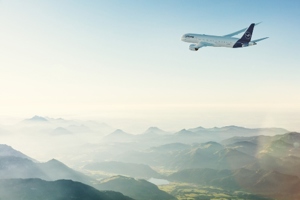Lufthansa Group and HCS Group sign Letter of Intent on the production and supply of sustainable aviation fuel ‘Made in Germany’
The Lufthansa Group and the HCS Group have signed a Letter of Intent (LoI) to partner on the production and supply of sustainable aviation fuel (SAF). From the beginning of 2026, the HCS Group could supply the Lufthansa Group with SAF produced in the so-called Alcohol-to-Jet (AtJ) technology. The SAF, made from biogenic residues from agriculture and forestry, will be produced at the HCS Group production site in Speyer, operated by Haltermann Carless. SAF is a key element for more sustainable flying and thus for decarbonization in aviation.
With its engagement in the HCS Group the Lufthansa Group could support SAF ‘Made in Germany’, compliant with Europe’s Renewable Energy Directive RED II. The production site is logistically favorably located near the Lufthansa Group's Frankfurt hub. The HCS Group offers sustainable hydrocarbon solutions to its customers. With the planned initial production volume of 60,000 metric tons of SAF per year, the chemical company aims to become the first large-scale producer of biogenic SAF in Germany.
The LoI with the HCS Group underpins the Lufthansa Group's goal of driving forward the market ramp-up and use of sustainable aviation fuels as a core element of its sustainability strategy. Today, the Lufthansa Group is one of the five largest SAF customers worldwide and is investing up to USD 250 million in the procurement of SAF for the coming years. In addition, the Lufthansa Group is working on numerous projects worldwide to increase SAF availability and is continuously examining further options for long-term purchase agreements.
SAF – the sustainable aviation fuel
sustainable aviation fuel (SAF) is the generic term for all aviation fuels that are produced without the use of fossil feedstocks such as crude oil and also meet sustainability criteria. There are various processes for the production of SAF - both with biogenic and non-biogenic feedstocks. The current SAF is mainly produced from biogenic residual materials such as used cooking oil. As a so-called "drop-in" solution, it is mixed with conventional kerosene before being transported to the airport. The maximum blending rate of SAF permitted under the fuel specification is currently 50 percent. In its pure form, SAF from biogenic residues can reduce CO2 emissions by up to 80 percent compared to conventional kerosene. The Lufthansa Group has been involved in SAF research for many years, has built up an extensive partner network and is driving forward the introduction of next-generation Sustainable Aviation Fuels in particular. Special focus is placed on SAF based on waste materials, renewable electrical energy (Power-to-Liquid, PtL) as well as on research into the direct use of sunlight for fuel synthesis (Sun-to-Liquid, StL).
Lufthansa Group pursues ambitious sustainability goals
The Lufthansa Group has set itself ambitious climate protection goals and aims to achieve a neutral CO2 balance by 2050. Already by 2030, the Lufthansa Group wants to halve its net CO2 emissions compared to 2019 through reduction and compensation measures. The reduction goal for 2030 was validated by the independent Science Based Targets initiative (SBTi) in August 2022. The Lufthansa Group was the first airline group in Europe with a science-based CO2 reduction target in line with the goals of the 2015 Paris Climate Agreement. For effective climate protection, the Lufthansa Group is focusing in particular on accelerated fleet modernization, the use of SAF, the continuous optimization of flight operations, and offers for its private travelers and corporate customers to make a flight or the transport of cargo more sustainable. In addition, the Lufthansa Group has been actively supporting global climate and weather research for many years.







Comments